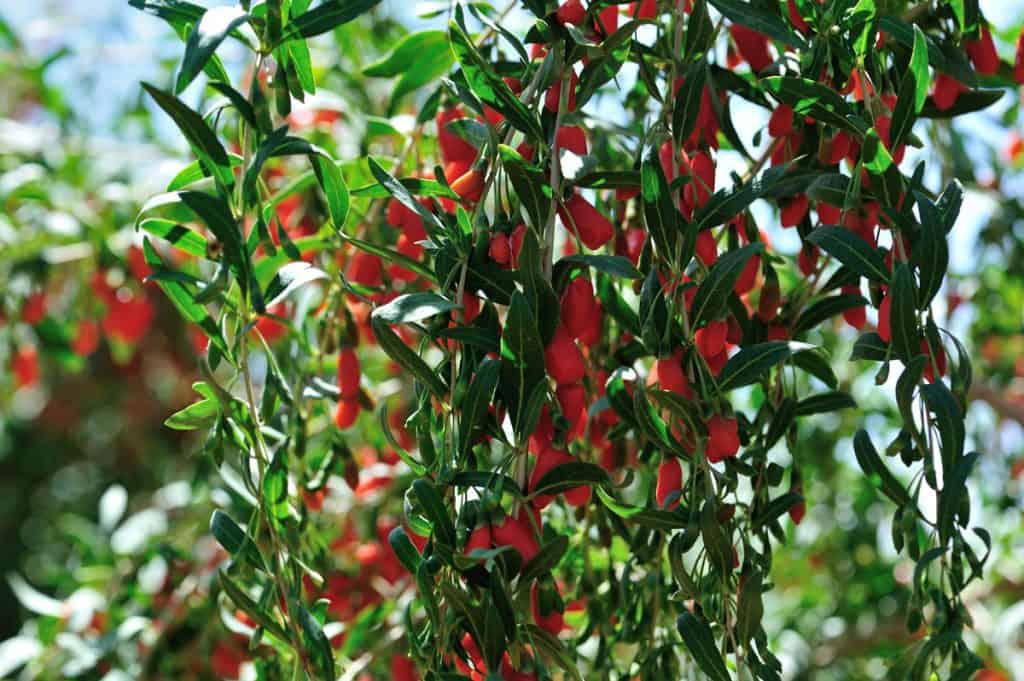Read time: 3.5 minutes
Interactive Content: Click tabs “What, Why, Where” to reveal more
GOJI BERRY BENEFITS
Goji Berries have some of the highest levels of beta-carotene among edible plants, which has been shown to benefit eyesight, skin health, and cell development. This important phytochemical is probably why the Chinese have revered this little red berry for hundreds of years for its ant-aging powers
Inside the super fruit
GOJI BERRY
Straight from the Source
Goji Berry
Goji Berry, or Lycium barbarum, is a slightly thorny deciduous woody shrub native to the Yellow River valley in northwest China that produced small red nightshades that have been valued in traditional Chinese medicine for their anti-aging powers.
History
In the 16th century the famous Chinese Phyto therapist and healer, Li Shudjun, remarked in his Foundations of Pharmacopedia that he was astonished by how many people in the village of Nanchu were centenarians, which he ascribed to the town’s water-well being surrounded by goji berries.
In the 18th century Archibald Campbell, the 3rd duke of Argyll, introduced the plant to the English Isle where it was used for hedgerows. Because it originated from the Dyke of Argyll’s garden, it is commonly referred to as The Duke of Argyll’s Tea Tree.
Until their recent introduction into health food markets under the name Goji berries, Europeans thought that the fruit of the Duke of Argyll’s Tea Tree was poisonous, and only valued the plant for its menial hedging habits.
Harvest
Goji berries grow optimally in cool, shady riverbanks which is why berries from Ningxia area in the valley of the Liupan Mountains and irrigated by the Yellow river are the most sought after. They begin bearing small purple flowers in the midsummer that turn into plump red berries in August when they are hand harvested with woven bamboo baskets before being dried in the sun. The shrubs typically do no start producing fruit until their second year and will not peak after five years.
Anatomy
The little bright orange-red fruit is a small ellipsoid berry that develops from a five-petal purple flower. The flowers grow in groups of one to three in leaf axils that shoot off from a three to nine-foot stalk.
Etymology
In the English-speaking world, the name Goji berry has only been around since the early 21st century and approximates the Mandarin word for the plant gǒuqǐ. Prior to that it was know as wolfberry which derives from a miss translation of its Latin name.
Goji Berry Benefits*
Goji Berries get their orange-red color by having some of the highest levels of beta-carotene among all edible plants. This important phytochemical has been shown to be vital for eye health, skin health, and cell development and is responsible for many of the berries benefits.
Historical Uses
Known as the red diamond due to its perceived value in traditional Chinese medicine where it has been thought to have anti-ageing powers, strengthen sexual vitality, and improve mood.
Other Potential Health Benefits of Goji Berry *:
- Improve vision
- Boost mood
- Help control blood sugar
- Increase energy levels
Our Goji Berry Sources
Our Organic Goji Berries are sustainably farmed and harvested from Wisconsin
GOJI BERRY
SUMMARY
We put this red diamond in our Recharge & Replenish to give your body the building blocks it needs to refuel. It is high in protein and loaded with Vitamin A, copper, and selenium.
ASHWAGANDHA
Benenfits
Ashwagandha’s is full of withanolides, which are a group of naturally occurring steroids that have been shown to help lower Cortisol levels leading to a reduction in stress and anxiety.
Go to blogBLUEBERRY
Benenfits
Our Replenish & Recharge is loaded with this little blue superfood to help your body fight the damages caused by free radicals with high levels of antioxidants, particularly a group of flavonoids called anthocyanins.
Go to BlogCHAGA
Benenfits
Chaga’s Benefits derive from its high concentrations of antioxidants, Vitamin D, and Manganese, and it has been used to alleviate arthritis, increase the production of cytokines, and lower blood sugar.
Go to Blog